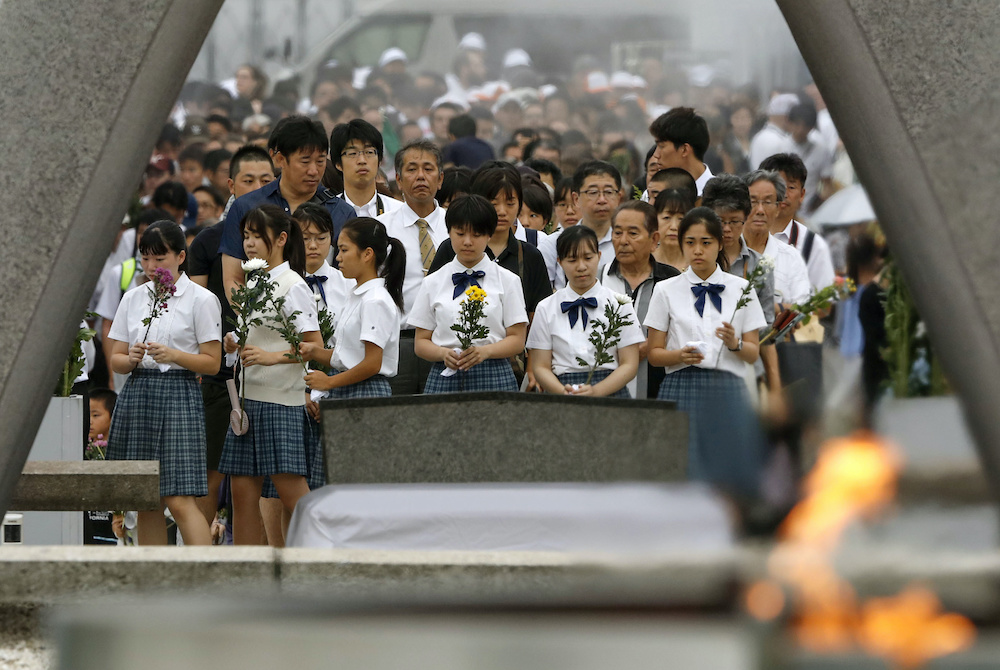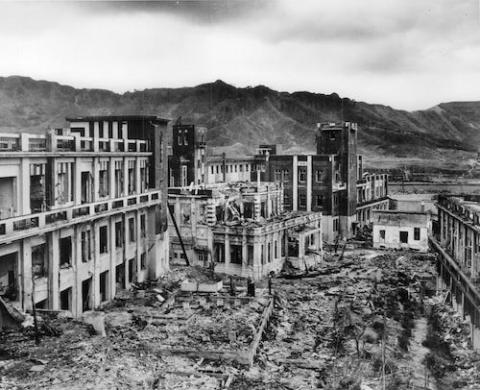
People in Hiroshima, Japan, pray for atomic bomb victims at Peace Memorial Park Aug. 6, 2019. Nuclear disarmament proponents will deliver messages of peace to the world in a campaign called The Ribbon 2020. The campaign commemorates the 75th anniversary of the atomic bombings of the Japanese cities of Hiroshima and Nagasaki. (CNS/Reuters/Kyodo)
Editor's note: The following is an excerpt from A World Free From Nuclear Weapons: The Vatican Conference on Disarmament, edited by Jesuit Father Drew Christiansen and Carole Sargent (Georgetown University Press). The book is a compilation of addresses given during a Vatican conference after which Pope Francis, on Nov. 10, 2017, became the first pope to take a complete stand against nuclear weapons, even as a form of deterrence. The following excerpt is the text of an address given at that conference by Wada Masako, a survivor of the atomic bombing of Nagasaki on Aug. 9, 1945, an event that took place three days after the first atomic bombing of Hiroshima. The 75th anniversary of the two bombings is this month.
I am very honored and deeply grateful for this opportunity to speak before you as a hibakusha (a survivor of the Hiroshima or Nagasaki bombings). I am Wada Masako, a hibakusha of Nagasaki. I was 22 months old when Nagasaki was devastated by the atomic bomb. My house was located 2.9 kilometers away from the blast center. Thanks to the mountains surrounding the central part of Nagasaki City, which somewhat shielded my house from the direct impact of the bomb, I have survived to this day.
On July 7, 2017, the Treaty on the Prohibition of Nuclear Weapons was adopted at the UN. After the atomic bombing of Hiroshima and Nagasaki, under the occupation of the United States, when even press reports about the atomic bombing were suppressed, hibakusha were left abandoned without any help either from the occupying forces or from the Japanese government. It was in the wake of the nationwide people's protest against nuclear weapons, triggered by the Bikini hydrogen bomb test in 1954, that hibakusha finally roused themselves to form Nihon Hidankyo, a national organization of hibakusha. During the last sixty-one years since then, through our determined actions, we have called for the elimination of nuclear weapons. To the hibakusha who have constantly appealed, "No more hibakusha," the adoption of the Ban Treaty has given tremendous hope and courage.
We would like to share our joy with the numerous unidentified A-bomb victims who are recorded only as statistics, with the many people who have gone before us in the antinuclear movement, with our supporters in Japan and internationally, and with the members of the International Campaign to Abolish Nuclear Weapons, who received the Nobel Peace Prize for their contribution to achieving the Ban Treaty. And above all, we would like to express our deep gratitude to the Holy See for leading the debates in various international forums for the prohibition and elimination of nuclear weapons, and for becoming one of the first governments to sign and ratify the treaty.
Advertisement
The preamble of the treaty, which recognized the "unacceptable suffering of and harm caused to the victims of the use of nuclear weapons (hibakusha)," clearly articulates the inhumanity of nuclear weapons. By the end of December 1945, about 210,000 people had died as a result of the bombing, including many who were killed instantly without knowing what had happened. Ninety percent of them were civilians, including elderly people and children. The deep sufferings of those who barely survived the bombing continued for a long period, even to this day — the loss of their loved ones; survivors' guilt; the scenes, sounds, and smells of the day burnt into their memories; diseases of unknown cause; economic difficulty; prejudice and discrimination in society; and many buried dreams. Those who were under the mushroom cloud — irrespective of their race, nationality, age, or sex — were forced to die or to continue to live as hibakusha.
Because I was then only a 22-month-old baby, I do not remember anything about that time, nor can I tell you of the indescribable tragedies that our senior hibakusha witnessed and experienced on that day and in the aftermath. But I was certainly there, together with my mother and grandfather. Allow me to share with you a little about what my mother used to tell me over and over again.
On August 9, after an air-raid warning was lifted, my mother was preparing lunch. I was playing alone on the floor of the entrance. At 11:02, she heard a big sound of an explosion. The next moment, windowpanes, sliding doors, and clay walls inside our house were all blown to pieces by the blast. A pile of mud and dust over 30 centimeters thick was left on the floor. Outside, my mother saw orange-colored smoke, which veiled the houses on the other side of the street. The green trees on the mountainsides surrounding the downtown area had turned brown.
On the mountain roads, she saw a file of people escaping from fires like ants, moving down over the mountain toward our area. They all looked brown with their scantily clad bodies burned all over and with their hair matted with blood and standing on end like horns.
The empty lot next to our house became a cremation ground, where dead bodies collected by garbage carts were brought in and incinerated day after day. My mother said that everyone soon became numb to the growing number of corpses and even to the stench from burning bodies. What is human dignity? Humans are not created to be treated like this.
She went to help medical staff at a temporary aid station, but she fainted at the sight of victims with horrible burns and injuries laid all over the floor. The next task allocated to her was to use a broom to remove maggots swarming on the wounds of the victims. They were so numerous and as big as your thumb.
The US military dropped a radio sensor with a parachute from the B-29, along with the atomic bomb. It was an instrument to measure the destructive power of the atomic bomb, including the blast pressure, intensity, and heat generated by the explosion. My mother used to say she wondered why that device did not provide the US military with information about the lives of the people and their families under the mushroom cloud, and the preciousness of human life.
My mother died six years ago at the age of 89. She was in and out of the hospital 28 times due to numerous illnesses, including heart troubles, stomach cancer, and liver cancer. Before she died, I once recorded what she witnessed in writing, but she seemed quite dissatisfied with what she read. She might have felt that no words or expressions could describe the hellish scenes she had witnessed. Other senior hibakusha must feel the same as she did. I always feel hesitant to share my mother's experience with other people, as I know I can never fully describe what really happened. But now that 72 years have passed, the average age of the survivors has reached 81, and we younger hibakusha must succeed their work and speak out on their behalf.

Nagasaki, Japan, showed scant signs of recovery four years after an atomic bomb was detonated over the city Aug. 9, 1945. (CNS/Reuters/Milwaukee Journal Sentinel files, USA TODAY NETWORK)
Nuclear weapons are inhuman weapons that will bring indiscriminate and widespread damage to the victims from the blast, from the heat rays and radiation, and from aftereffects that last for many years. If they are ever used again, the same suffering that the hibakusha have gone through will be inflicted on many people all over the world. In Nihon Hidankyo's founding statement "Message to the World" of 1956, we declared: "Our will to save humanity from its crisis through the lessons learned from our experiences, while at the same time saving ourselves." With this pledge, we have continued to work for the elimination of nuclear weapons. With the adoption of the treaty, a heavy and rusty door has begun to open, and we are finally seeing a ray of light illuminating a path to achieve our goal.
Hibakusha have given testimonies on their experiences across the world, despite the painful memories drawing them back to those two days. We note the word "public conscience" stated in the preamble of the treaty. "Public conscience" is essential for securing the benefit for the public, the human race, and Mother Earth. Power is not justice. Nuclear weapons are an injustice that must be abolished by the responsibility of the humans who made them. It is the role of public conscience and justice to pray and to accumulate small efforts for achieving the elimination of nuclear weapons. We must continue to urge the nuclear-armed states and their allies, including Japan, to sign and ratify the Treaty on the Prohibition of Nuclear Weapons.
In April 2016 we started the International Signature Campaign in Support of the Appeal of the Hibakusha for the Elimination of Nuclear Weapons. To date, we have submitted more than 5.15 million signatures to the United Nations. We set our goal to achieve hundreds of millions of signatures by 2020 all over the world, by rallying the public conscience of many people. I sincerely ask each one of you here today, as representatives of civil society, as human beings with dignity and as peacemakers, to raise a loud voice from the Vatican for achieving the abolition of nuclear weapons.



